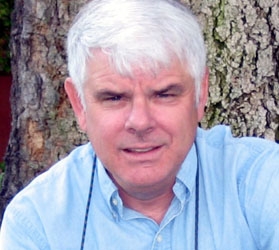
“Mel has been a mentor and leader within the range science community his entire career,” said Ken Tate, UC Cooperative Extension specialist, who holds the Russell L. Rustici Endowed Chair in Rangeland Watershed Sciences. “Mel’s ability to see emerging issues on rangelands, and to position UC ahead of these issues, has allowed us to keep our research and extension at the forefront of rangeland management.”
When George arrived at UC Davis in 1978, he was responsible mainly for forage trials, helping ranchers keep their land productive. But George could see issues with grazing and water quality on the horizon and worked to head them off at the pass.
In the early 1990s, he spearheaded the UC Cooperative Extension Rangeland Watershed Program, which uses education and applied research to help ranchers and regulators mitigate the risk of pathogens in water runoff from rangeland. Some 80 percent of California’s water passes through or is stored on rangeland and the UC Cooperative Extension Rangeland Watershed Program has helped develop management practices that keep that water clean.
“The Rangeland Management Program has been a tremendous help in protecting open space, habitat for plants and wildlife and healthy watersheds that California rangelands provide,” says Tracy Schohr, director of the California Rangeland Conservation Coalition, a band of 100 diverse environmental, ranching and policymaking groups committed to protecting the state’s diminishing rangeland. “They educate land managers and provide the objective, accurate information we need.”
George’s research and extension has improved millions of acres of rangeland in the United States, Africa, Europe, China and beyond. In 1991, for example, George worked with Chinese researchers to develop a research site in the Tibetan Plateau of Szechwan Province, helping develop a winter feeding program for their yak herds that doubled the survival of yak calves. In 1994, George helped Albania develop grazing practices to protect new forest plantations to replace those destroyed during the transition from Communist to democratic rule.
The list goes on and on.
“Mel has a knack for taking a complicated process and making it navigable for ranchers and other land managers,” says Tate who, like George, has been based in the UC Davis Department of Plant Sciences. “He has greatly advanced both the art and science of rangeland management.”
George got into range management in a round-about way, a journey that passed through farming and animal science and was nearly cut short by a plane crash.
Farming is in George’s blood going back 15 generations, a fact he learned not too long ago when he became a genealogy buff. He was raised in the Butte County town of Gridley and was the first in his family to attend college, receiving his bachelor’s degree in animal science from California State University, Chico. During his senior year at Chico, a professor interested him in range management, which led him to Texas Tech where he received his master’s in range management in August 1969.
The Vietnam War was in progress and in October 1969, George was drafted into the U.S. Army. In November 1970, he boarded a plane bound for active duty that crashed during takeoff, killing 40 people aboard. George was severely burned.
“But I lived, and was released with a medical profile that prevented me from going to a war zone,” George says.
He was stationed at Fort Ord until the summer of 1971 when he and his wife, Gail, moved to Logan, Utah, where George earned his Ph.D. in range ecology at Utah State University. He worked nearly three years on the faculty at California Polytechnic State University, San Luis Obispo, before coming to UC Davis in 1978.
George has earned countless awards over the years, including the Outstanding Alumnus at Utah State University in 2000, the prestigious James H. Meyer Distinguished Achievement Award at UC Davis in 2007 and the College of Agriculture Distinguished Alumnus Award from Chico State University in 2008.
George will stay busy in retirement, still working on a slew of rangeland research projects under way in the UC Davis Department of Plant Sciences.
“It’s such a fascinating field because rangeland is the most complex agricultural system there is,” George says. “You have to be willing to think outside the box to manage so many moving parts, and I like that. There are so many issues on the horizon like carbon storage and protecting biodiversity.”
And even in retirement, George will do all he can to keep our rangelands healthy and sustainable for generations to come.